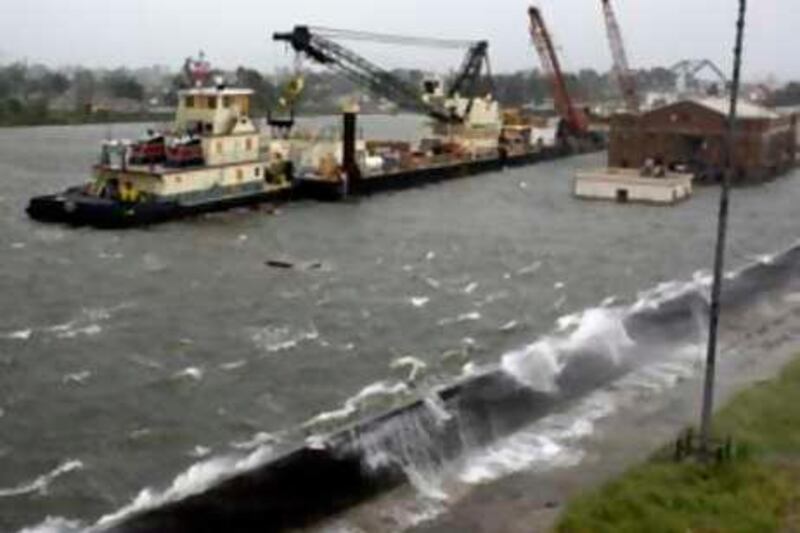Hurricane Gustav slammed into the US Gulf Coast today, driving a surge of water to the top of the levees protecting New Orleans, officials said. The storm arrived almost exactly three years after the low-lying city was catastrophically swamped by Katrina. New Orleans was again under threat of flooding as water crashed over the lip of the earth levee protecting its Upper Ninth Ward. Shortly before 10am (7pm UAE) the eye of the massive storm crossed land just west-south-west of Cocodrie, Louisiana, 110km south-west of New Orleans, the National Hurricane Center said. "The storm is weakening, but it is slowing. That is bad news," meteorologist Jody James said. The region faces "several more hours of rain" and "serious flooding" is possible, he said. Asked if Gustav could be as bad as Katrina, Mr James said: "It's a little early to say. Katrina was a Category Four downgraded to three just before landfall. Gustav is a little bit weaker." The expert added: "We are watching the levees." Two boats and a barge had broken free in the Industrial Canal, triggering fears that the vessels may crash through the waterway's wall in a repeat of what happened during Katrina in 2005, but media reported the barges had been secured by the US Coast Guard. Oil production in the Gulf region was shut down while the Republican Party suspended the start of its election convention. President George W Bush headed for Texas to monitor emergency preparations for Gustav, which has killed more than 80 people in the Dominican Republic, Haiti and Jamaica. As the storm raged ashore, water was nearly to the top of the Industrial Canal lining the city's Ninth Ward neighbourhood. Wind-whipped waves sprayed over the canal wall, a portion of which gave way during Katrina, destroying the district. "We are concerned about any of this overtopping," said Major Tim Kurgan of the Army Corps of Engineers. "These walls are all safe to the top," he stressed, with the levees still undergoing a US$15 billion rebuilding programme after Katrina's enormous damage. But a surge of water driven by Gustav had yet to hit the coast, and would almost certainly send water flooding over the wall protecting the Ninth Ward, officials warned. The New Orleans mayor Ray Nagin, who has ordered a curfew and vowed to throw looters into prison, told local television the city had become a "ghost town" after a mandatory evacuation forced nearly two million people to flee. "We don't want to get caught up in the Katrina craziness," Wilson Patterson, 48, said as he prepared to board a bus with wheelchair-bound Earline Martin, 84. Only about 10,000 residents remained, Mr Nagin said, as residents reported tornado sightings in the area around New Orleans. At 10am local time the eye of the storm was pummelling the marshy Mississippi river delta coastline with winds of up to 175kph, the National Hurricane Center said, while its tempestuous outer edges were already stretching far into Louisiana. Gustav weakened to a Category 2 storm as it neared colder coastal waters, but government forecasters warned of an "extremely dangerous" water surge of up to 14 feet (4.2 meters), enough to worry locals after Hurricane Katrina burst New Orleans' levees in 2005 and flooded the city for days. Louisiana Governor Bobby Jindal told reporters there were unconfirmed reports that three critically ill patients died while being transported to safer ground. Doctors "had to weigh the risk between sheltering in place and evacuating and made the decision they thought was best for their patients," he said. Louisiana officials said there were about 750 National Guard troops in New Orleans if a new rescue operation was needed, with memories still fresh of the destruction wrought by Katrina and the government's botched response. Katrina made landfall near New Orleans on August 29, 2005, smashing poorly built levees surrounding the city and causing massive floods that destroyed tens of thousands of homes and killed nearly 1,800. The US president George W Bush traveled to Austin, Texas early today to assess the government response. *AFP
Gustav hits New Orleans
Hurricane Gustav batters New Orleans, almost exactly three years after the city was catastrophically swamped by Katrina

Editor's picks
More from the national





